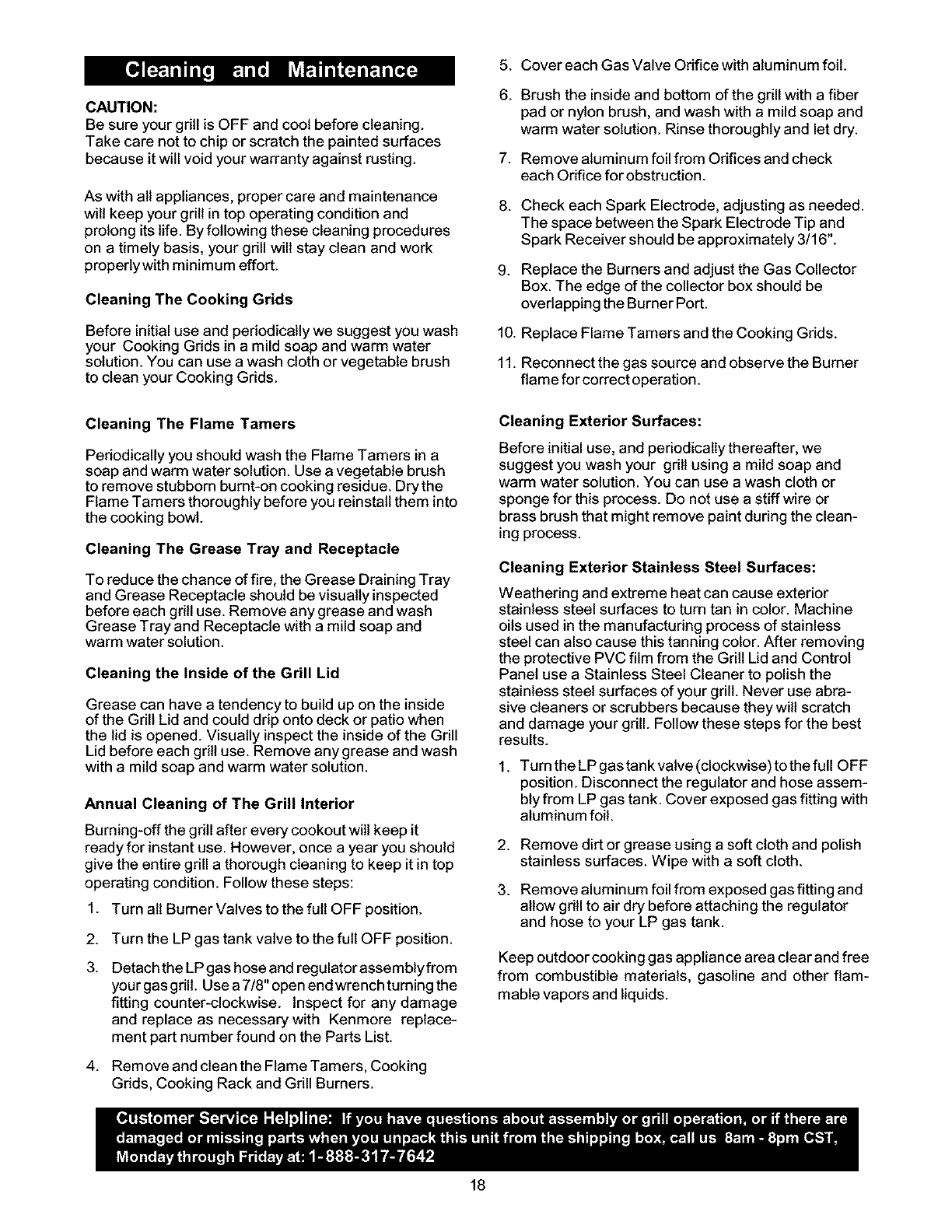
CAUTION:
BesureyourgrillisOFFandcootbeforecleaning.
Takecarenottochiporscratchthepaintedsurfaces
becauseitwillvoidyourwarrantyagainstrusting.
Aswithallappliances,propercareandmaintenance
willkeepyourgrillintopoperatingconditionand
prolongitslife.Byfollowingthesecleaningprocedures
onatimelybasis,yourgrillwillstaycleanandwork
properiywithminimumeffort.
CleaningThe Cooking Grids
Before initial use and periodically we suggest you wash
your Cooking Grids in a mild soap and warm water
solution. You can use a wash cloth or vegetable brush
to clean your Cooking Grids.
Cleaning The Flame Tamers
Periodically you should wash the Flame Tamers in a
soap and warm water solution. Use a vegetable brush
to remove stubborn burnt-on cooking residue. Drythe
Flame Tamers thoroughly before you reinstall them into
the cooking bowl.
Cleaning The Grease Tray and Receptacle
To reduce the chance of fire, the Grease Draining Tray
and Grease Receptacle should be visually inspected
before each grill use. Remove any grease and wash
Grease Tray and Receptacle with a mild soap and
warm water solution.
Cleaning the Inside of the Grill Lid
Grease can have a tendency to build up on the inside
of the Grill Lid and could drip onto deck or patio when
the lid is opened. Visually inspect the inside of the Grill
Lid before each grill use. Remove anygrease and wash
with a mild soap and warm water solution.
Annual Cleaning of The Grill Interior
Burning-off the grill after every cookout will keep it
ready for instant use. However, once a year you should
give the entire grill a thorough cleaning to keep it in top
operating condition. Follow these steps:
1. Turn all Burner Valves to the full OFF position.
2. Turn the LP gas tank valve to the full OFF position.
,
Detach the LP gas hose and regulator assemblyfrom
your gas grill. Use a7/8" open end wrench turning the
fitting counter-clockwise. Inspect for any damage
and replace as necessary with Kenmore replace-
ment part number found on the Parts List.
4. Remove and clean the Flame Tamers, Cooking
Grids, Cooking Rack and Grill Burners.
18
.
6.
7,
8.
g.
10.
11.
Cover each Gas Valve Orifice with aluminum foil.
Brush the inside and bottom of the grill with a fiber
pad or nylon brush, and wash with a mild soap and
warm water solution. Rinse thoroughly and let dry.
Remove aluminum foil from Orifices and check
each Orifice for obstruction.
Check each Spark Electrode, adjusting as needed.
The space between the Spark Electrode Tip and
Spark Receiver should be approximately 3/16".
Replace the Burners and adjust the Gas Collector
Box. The edge of the collector box should be
overlapping the Burner Port.
Replace Flame Tamers and the Cooking Grids.
Reconnect the gas source and observe the Burner
flame for correct operation.
Cleaning Exterior Surfaces:
Before initial use, and periodically thereafter, we
suggest you wash your grill using a mild soap and
warm water solution. You can use a wash cloth or
sponge for this process. Do not use a stiff wire or
brass brush that might remove paint during the clean-
ing process.
Cleaning Exterior Stainless Steel Surfaces:
Weathering and extreme heat can cause exterior
stainless steel surfaces to turn tan in color. Machine
oils used in the manufacturing process of stainless
steel can also cause this tanning color. After removing
the protective PVC film from the Grill Lid and Control
Panel use a Stainless Steel Cleaner to polish the
stainless steel surfaces of your grill. Never use abra-
sive cleaners or scrubbers because they will scratch
and damage your grill. Follow these steps for the best
results.
1,
Turn the LP gas tank valve (clockwise) to the full OFF
position. Disconnect the regulator and hose assem-
bly from LP gas tank. Cover exposed gas fitting with
aluminum foil.
2,
3.
Remove dirt or grease using a soft cloth and polish
stainless surfaces. Wipe with a soft cloth.
Remove aluminum foil from exposed gas fitting and
allow grill to air dry before attaching the regulator
and hose to your LP gas tank.
Keep outdoor cooking gas appliance area clear and free
from combustible materials, gasoline and other flam-
mable vapors and liquids.
